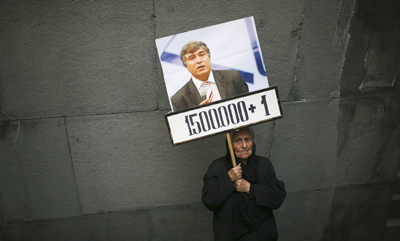Dink was assassinated with three bullets to the head on January 19, 2007, in front of his newspaper, Agos. He received numerous death threats after he angered Turkish ultranationalist groups with a series of articles that tackled identity issues of Turkish-Armenians, the Armenian origins of one of Ataturk’s adopted daughters, and the role of Ottoman Turkey in the World War I killings of Armenians.
In a judgment announced on the court’s website, it ruled that “the authorities failed in their duty to protect the life and freedom of expression of the journalist Firat (Hrant) Dink.” According to the court, “none of the three authorities informed of the planned assassination and its imminent realization had taken action to prevent it.” The court also ruled that “no effective investigation had been carried out into the failures which occurred in protecting the life of Firat Dink.”
While the verdict can be appealed within three months at the ECHR’s Grand Chamber, Turkey’s Foreign Ministry said in a statement Tuesday that the country would not appeal the decision and that it “would abide by the ruling and take measures to prevent reoccurrence of such violations,” The Associated Press reported.
“The ECHR’s ruling is a reminder that three and a half years after Hrant Dink’s murder, justice remains elusive,” said Mohamed Abdel Dayem, CPJ’s Middle East and North Africa program coordinator. “We call on the Turkish authorities to abide by the ruling, as the foreign minister has already indicated they would, and to finally bring the perpetrators to justice.”
Dink was convicted in 2006 under article 301 of the penal code for “denigrating Turkish identity.” Before his death, Dink turned to Strasbourg to challenge the verdict under Article 10 of the European Convention on Human Rights, which guarantees the right to freedom of expression. ECHR found that the Turkish court ruling “made [Dink] a target for extreme nationalists, and the Turkish authority, who had been informed of the plot to kill him, had not taken steps to protect him.” After his death, Dink’s family filed a lawsuit under Article 2 of the European Convention on Human Rights, which guarantees the right to life. The ECHR combined both cases into Dink vs. Turkey.
Turkey, as a member of the Council of Europe, is a signatory of the European Convention on Human Rights and as such is bound to abide by ECHR rulings.
The court ordered Turkey to pay Dink’s family 105,000 euros (US$135,000) in compensation. The family also received 28,595 euros (US$36,800) for legal proceedings. The family said it would donate the money to educational charities, according to AP.
“We hope that the Turkish State, which until today has not fulfilled any of its duties related to freedom of expression or the murder investigation and trial process in a praiseworthy way, will abandon its practice of acquitting the guilty and convicting the innocent and take its first steps to behave like a state worthy of society’s trust,” Dink’s widow told the press after the court’s ruling.
Fethiye Cetin, a Dink family lawyer, speaking through a translator, told CPJ that his lawyers are pleased with the ECHR’s decision. “We hope that the Turkish authorities will apply the decision of the European Court,” she said. Cetin said the lawyers will ask Turkish authorities for a new inquiry into Dink’s murder with the goal of providing new witnesses and documents to shed light onto the possible involvement of Turkish officials in his death.
